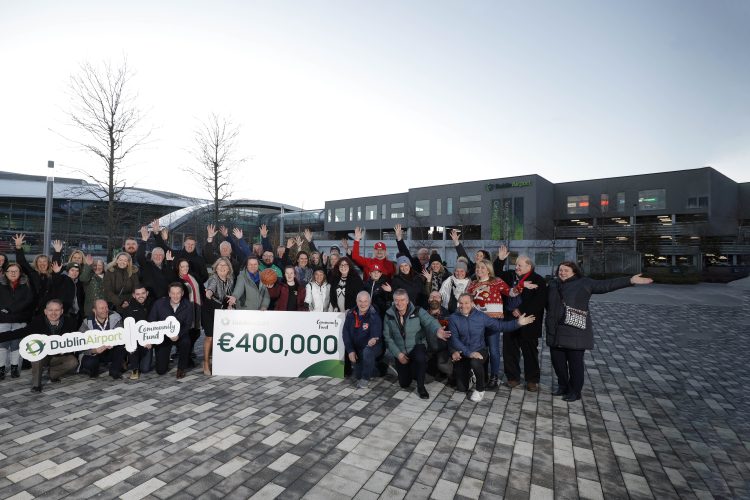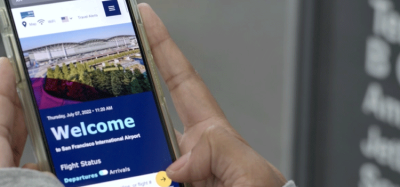Creating a climate positive culture
- Like
- Digg
- Del
- Tumblr
- VKontakte
- Buffer
- Love This
- Odnoklassniki
- Meneame
- Blogger
- Amazon
- Yahoo Mail
- Gmail
- AOL
- Newsvine
- HackerNews
- Evernote
- MySpace
- Mail.ru
- Viadeo
- Line
- Comments
- Yummly
- SMS
- Viber
- Telegram
- Subscribe
- Skype
- Facebook Messenger
- Kakao
- LiveJournal
- Yammer
- Edgar
- Fintel
- Mix
- Instapaper
- Copy Link
Posted: 8 September 2023 | Andrea Carroll | No comments yet
In International Airport Review’s Issue 2 2023, Andrea Carroll, Group Head of Sustainability at daa, wrote exclusively for International Airport Review about how they are striving to meet sustainability targets, but also working to be a socially responsible enterprise who supports surrounding communities.


The community fund by the daa. CREDIT: daa
daa is best-known as the operator of Ireland’s two busiest airports, Dublin Airport and Cork Airport. The company also operates on an international level through Aer Rianta International (ARI), which manages retail operations in airports in 15 countries worldwide, as well as airport operation management and consultancy through our daa International (daaI) business. The daa strives to create a climate positive culture.
Our passengers, customers, people, and local communities expect us to be a responsible business that enhances our economic contribution in a sustainable and fair manner. The economic activity facilitated by our airports is significant and includes direct employment at our airports, and indirect employment in travel, tourism, and hospitality. Ireland, as a peripheral, island nation within Europe must prioritise and support the transition to a sustainable aviation model for the security and sustainable development of our economy.
It’s well-known that climate change is the greatest challenge of our time. As part of the broader aviation industry, daa is striving to reduce the impact on the environment. Work is also being done to positively influence our supply chains and enable initiatives to encourage sustainable business practices both internally and externally. As a company, we welcome the challenge posed by the climate targets that have been set by national and international governments. Additionally, we have set our own corporate ambitions: for daa group to be a net zero business by 2050, and specifically for Dublin Airport to reduce its carbon and energy usage by 51% by 2030 (vs 2018) – a target which is aligned with national carbon reduction ambition.
With such significant commitments, it is vital that we both track and understand our progress. As part of the company’s ESG programme, daa is preparing for future Non-Financial Reporting under the Corporate Sustainability Reporting Directive in 2026. This ESG Strategy was published in 2021 and highlights the company’s commitments under the pillars of Environmental Sustainability, People, Community and Economy, with 39 ESG pledges. Airlines, ground handlers, concessionaires, regulators, and transport operators have all committed to working with us, to deliver on our climate and ESG ambitions.
It starts with culture
In addressing the challenges of environmental sustainability, daa identified three driving principles: decarbonisation; circularity; and creating healthy local environments (focusing on noise, air, water, and biodiversity). A focus on innovation, communication and ongoing engagement will enable us to address these principles. However, the most essential enabler is for daa to develop a passionate group of educated and empowered colleagues who will drive sustainability forward; and the vision for this is to create a Climate Positive Culture across the whole of daa.
Achieving a climate positive culture in daa will require that those working within the organisation both understand and feel the importance of our sustainability agenda and their part in delivering on it. To make this happen, a Sustainability Ambassador Programme was established which calls for colleagues with an interest in sustainability to volunteer to become change-makers. There are now more than 100 passionate colleagues from across the group who are driving awareness and action in sustainability across every function of the business. These ambassadors have scoped and initiated projects in collaboration with their colleagues including seeking fuel alternatives, the removal of plastics and measurable waste reduction. With an educated and empowered colleague base driven by a Climate Positive Culture it is possible that the ambitious targets in place can be met.
In 2022, the initiatives put in place led to a 24% reduction in carbon emissions at Dublin Airport and a 38% decrease at Cork Airport, versus a 2018 baseline average. This was achieved through the implementation of a robust energy management process along with continued LED upgrade works, a fleet replacement programme and participation in the national Reduce Your Use Campaign.
A focus was also placed on assessing staff mobility trends on the Dublin Airport campus, as the migration from remote to office working increased. There was a notable and welcome jump in bus travel to the airport in 2022, with 35% of staff utilising bus services versus 19% in 2021 and daa’s objective is to continue to support and increase sustainable modes of public transport to the airports we operate.
Community impact
daa is also a proactive contributor to the Dublin Airport Environmental Working Group (DAEWG), which focuses on issues such as aviation noise, air quality monitoring and the development of airport infrastructure. The forum is independently chaired and includes representatives from both local communities and local authorities.
Dublin Airport’s €10 million Community Fund supports local initiatives that focus on the environment and sustainability, sports and recreation, social inclusion and community development, health and wellbeing, and culture and heritage. The fund allocated almost €400,000 to 80 projects in 2022 and to date has donated almost €2 million. Cork Airport, meanwhile, hosted 12 exhibitions by local artists at the airport in 2022. Furthermore, since 2007, daa staff have raised over €3.4 million for Irish charities.
A duty of care
daa’s people have demonstrated incredible resilience and support for each other over recent years. A clear commitment exists within the organisation to continue to create and embed a culture where colleagues feel supported and engaged and where opportunities are provided for personal and professional growth. This is particularly the case when it comes to the development of leadership capability at all levels, through leadership and management programmes, a graduate programme, and off-site days to allow people to reconnect and refuel. Work is also being done to encourage greater gender balance within the organisation, including specific training programmes for executive women, a celebration of International Women’s Day and increasing female membership of our Board. Elsewhere, Mental Health First Aid (MHFA) training has been rolled out to over 90 employees across the organisation.
Russia’s invasion of Ukraine was a shock to everyone, and this war has forced millions of people to flee their homes. In response, daa opened the original terminal building at Dublin Airport as a welcome reception centre for the most vulnerable, including women, children, and the elderly arriving from Ukraine at the outset of the war. daa’s staff offered warm and generous hospitality to those who were forced to flee their homes and worked with government departments to facilitate the reception of Ukrainian guests at Dublin Airport.
daa has a long record of engaging with local neighbours regarding the issues that are of importance to them. This is done through various approaches including public meetings and one‑to‑one home visits. In addition to daa’s school’s insulation programme, Dublin Airport also offered free insulation to more than 200 local residences including acoustic glazing, ventilation, and attic insulation. A voluntary house purchase scheme has also been developed for those residents most impacted by airport operations.
Over the months and years to come, daa will continue to build and evolve our ESG programme and credentials, ensuring they are embedded into everything we do as a business. We are acutely aware of the scale of the task that lies ahead, but our focus remains steadfast on achieving net zero carbon emissions by 2050, while continuing to both recognise and fulfil our role as an economic enabler.


About the author
Andrea Carroll is Group Head of Sustainability at daa. She is an accomplished senior sustainability professional working across the organisation to set sustainability strategy and ensure environmental compliance. She is focused on the advancement of sustainable aviation and leading the transformational change required to not only meet but exceed on sustainability commitments.
She has a long history of success working in the environmental and climate sector in both private and public sector organisations; she moved to daa from a global sustainability role with Amazon Web Services where she worked on global carbon, climate and biodiversity initiatives.
Andrea completed her MBA in international business at Griffith College Dublin and holds honours Masters degrees in Geography and Environmental Management from University College Dublin.
Issue
Related topics
Biodiversity, Passenger experience and seamless travel, Social responsibility, Sustainability, Sustainable development
Related airports
Related organisations
daa, DAA International (DAAI), Dublin Airport Environmental Working Group (DAEWG)


















